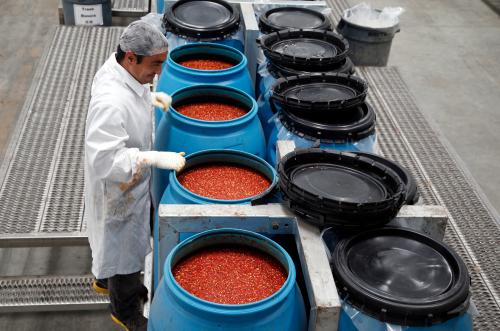This piece was originally published by The Hill.
On Dec. 15, thousands of immigrants, myself included, were called “the worst of the worst” by President Trump at a ceremony honoring police officers and sheriffs. He was referring to those of us who had won the diversity visa lottery, which granted us permanent residence in the United States.
My tweet reacting to the speech went viral, probably because I’ve been privileged enough to have accomplished many things since winning a green card, such as having completed doctoral studies at Harvard and joining a highly respected think tank. I did all of this while paying my fair share of taxes.
My story is not unique, and, as a researcher on the economic benefits of migration, I can say that most other migrants actually are good people, work hard, pay taxes, and often create jobs even at a higher rate than natives.
Take David Tran, who in 1978 arrived in California as a refugee from Vietnam. Two years later, he founded Huy Fong, a company that produces and exports a highly popular version of Sriracha sauce.
Huy Fong, named after the refugee vessel on which Tran came to the U.S., earns millions in sales year and employs hundreds. Tran’s tale is just one of many that illustrate how first- or second-generation migrants have shaped the U.S. economy.
While the United States undoubtedly needs a comprehensive reform of its migration policy, whatever that overhaul entails, reforms need to be grounded in the fact that less migration and less diversity will not solve the problems facing American workers or job seekers.
The reasons are fourfold.
First, the extent to which migrants take over the jobs of natives relates to whether migrants and natives are competing for the same jobs or not. Economists have found, however, that for the most part, migrants (low- and high-skilled) compete with other incumbent migrants, not with natives.
In fact, the same study shows that, between 1990 and 2006, immigration had a small positive effect on the wages of American-born workers, as the presence of migrants encourage natives to specialize in better jobs. Reducing immigration is not protecting the salaries of the American workers.
I won a green card through the #Diversity lottery & was just called *trash* by @POTUS. Since then Ive completed a PhD at @Harvard, became a fellow at @BrookingsInst & paid LOTS of taxes. I know many others who contribute a lot to this country. Oh well, perspectives… https://t.co/eTAfOKw0WB
— Dany Bahar (@dany_bahar) December 15, 2017
Second, migrants are highly entrepreneurial and create jobs. While immigrants represent about 15 percent of the general U.S. workforce, they account for around a quarter of this country’s entrepreneurs and a quarter of inventors.
Moreover, over one-third of new firms have at least one immigrant entrepreneur in its initial leadership team. The amount of jobs created by these firms are significant. Firms founded exclusively by immigrants have an initial size of just below five employees, whereas firms with a mixed founder team (immigrants and non-immigrants) have an average initial size of 17 workers.
Young companies have created about 1.5 million jobs per year over the past three decades. Cutting out immigration is equivalent to cutting out new jobs for the American people.
Third, immigration and diversity foster economic growth. More diverse countries perform better economically and migrants create business networks with their home countries that foster trade and investment.
According to the U.S. Department of Commerce, exports to Mexico, Canada, the European Union, China, Korea, Japan and others in 2015 supported over 8.3 million jobs. Cutting immigration would hurt economic growth and isolate America from the global economy.
Fourth, subsequent generations of migrants contribute considerably to the economy, thus offsetting the cost of absorbing first-time migrants. While the average fiscal burden of each immigrant is about $1,600, second- and third-generation migrants create a net positive fiscal contribution of $1,700 and $1,300, respectively.
In addition, migrants and their families also eat, wear clothes, consume housing and all sorts of other goods and services, which contributes to economic growth.
Closing the door to legal migrants, whether they are skilled or unskilled, won’t result in better salaries or more jobs. On the contrary, migrants are an important ingredient in the recipe of economic prosperity. For this country to remain great, it needs more people like Mr. Tran.
The Brookings Institution is committed to quality, independence, and impact.
We are supported by a diverse array of funders. In line with our values and policies, each Brookings publication represents the sole views of its author(s).





Commentary
Op-edGive me your tired, your poor…and they will create jobs for us
December 28, 2017